Department of History, Columbia University, New York
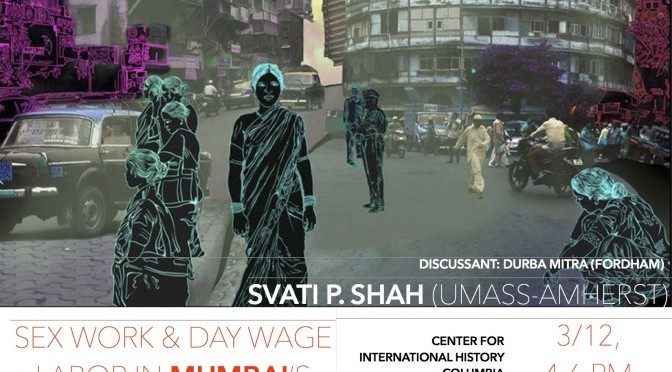

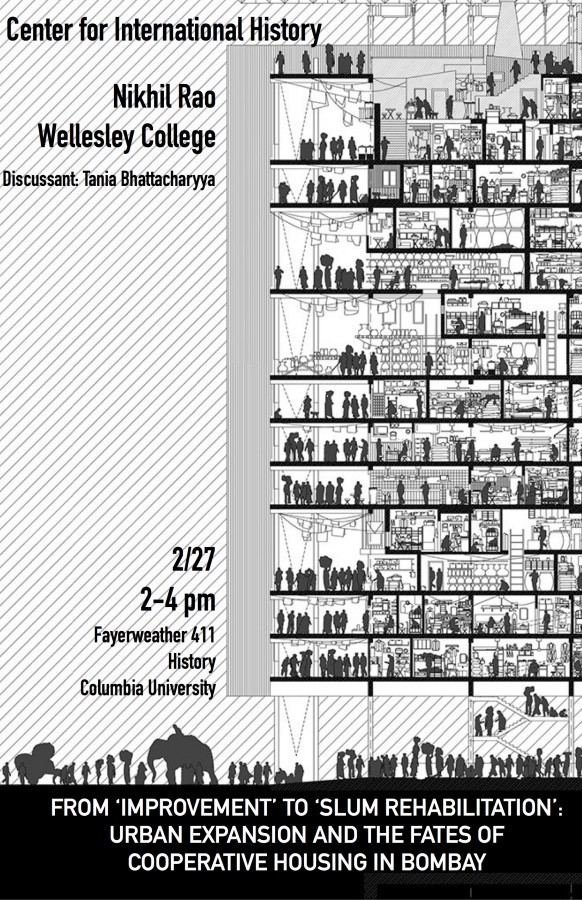
Professor Rao is a scholar of urban history and urban economic and political development in South Asia. Rao is the author of House, but No Garden: Apartment Living in Bombay’s Suburbs, 1898–1964 (Minnesota, 2012)
*(poster image is detail from UGO Architecture‘s imagined redesign of Dharavi)
Paul T. Zeleza
Department of History
Quinnipiac University
“Domestic Transformations in Contemporary Africa: What Role for the Diaspora?”
Wednesday, March 4, 4-6pm Fayerweather 411
Discussant: Ndieme Ouleye Ndoye
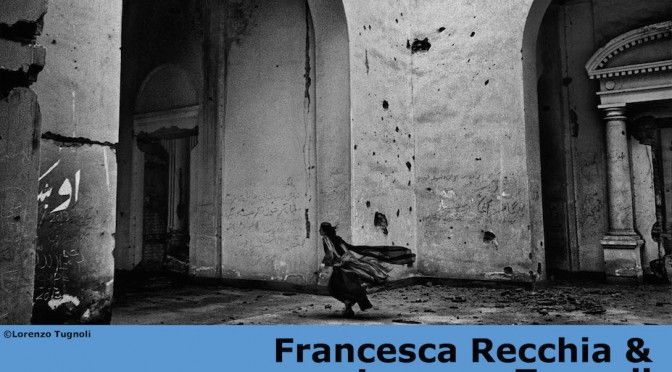
Wednesday, December 10th
411 Fayerweather
4:15 – 5:45pm
The Little Book of Kabul, is a book project that depicts a portrait of Kabul through the daily activities of a number of artists who live in the city. With an evocative tone, it focuses on the tiny details that escape grand narratives. Colours and gestures, smells and accents. In 20 short stories and 47 black and white photographs, The Little Book of Kabul dives into the lives of the three main characters exploring what it means to be an artist in Kabul and hence unveiling the beauty and brutality of the city.
Dr. Francesca Recchia is an independent researcher and writer who has worked and taught in different parts of the world, including India, Iraq, Afghanistan, Pakistan, Palestine. She is interested in the geopolitical dimension of cultural processes and in recent years has focused her research on urban transformations and creative practices in countries in conflict. She was the director of the 4th Afghanistan Contemporary Art Prize and is the author of three books, The Little Book of Kabul (with Lorenzo Tugnoli), Picnic in a Minefield and Devices for Political Action (with a photo-essay by Leo Novel).
Lorenzo Tugnoli is a documentary photographer based in Kabul. His work has been published by The New York Times, Le Monde, Newsweek, Time Magazine, Wired, The New Republic, The Atlantic, Der Spiegel as well as several Italian magazines. He is a regular contributor of the The Washington Post and The Wall Street Journal.
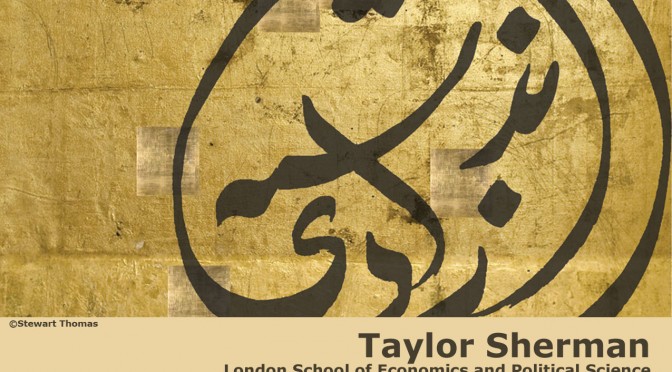
Indian Secularism on a Global Stage: Reconsidering Muslim Belonging in Nehru’s India
by Prof. Taylor C. Sherman, London School of Economics and Political Science
Discussant: Prof. Manu Bhagavan, Hunter College/CUNY
Wednesday, Nov 19, 2014
208 Knox Hall
4pm-6pm
Muslim belonging in India since independence has been anchored using the language of secularism. However, the rise to power of the BJP in recent decades and the concomitant anti-Muslim violence in India has led some to declare that India’s secularism is in crisis. Much of the discussion surrounding this issue is predicated upon the assumption that India’s secularism was firmly established under the rule of the first Prime Minister of independent India, Jawaharlal Nehru. This paper takes a new look at secularism in Nehru’s India. Rather than focusing on what Nehru said in his speeches and letters, this paper examines notions of secularism as the term was deployed on multiple levels of government and in wider society. It reassesses Nehru’s influence, and explores the ways in which calculations about the treatment of Indian Muslims in India were often worked out on a global stage.
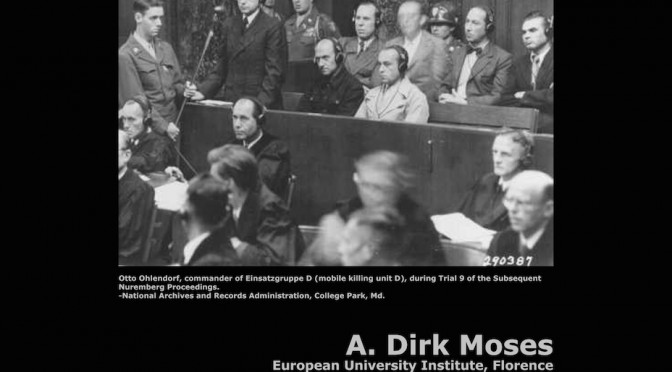
• “How and Why Did Genocide Become a Non-Political Crime” by A. Dirk Moses (Professor of Global and Colonial History (19th-20th centuries), EUI)
Tuesday, September 23rd
4:00PM to 6:00PM, 411 Fayerweather
International law distinguishes between political and the non-political crimes in the following way: racial hatred is defined as non-political because victims are attacked for who they are: for their identity. Genocide cannot occur where a victim group has agency, as in, say, launching an insurgency, because such action implies politics. This conception of genocide as a non-political, mass hate crime is modeled on the Holocaust of European Jewry, meaning that Holocaust memory intersects in important ways with the humanitarian intervention agenda. To galvanize the “will to intervene,” human rights activists must make contemporary civil wars resemble the Holocaust by casting civilians as victims of murderous racial persecution: for who they are rather than for what some of them may have done. The spurious distinction between racial and political intentions—the depolicitization of the genocide concept—lies at the heart of the relatively new field of genocide studies and its older sibling, Holocaust studies. One consequence is the promotion of toleration as genocide’s antidote. Another is that genocides are misrecognized, as in the case of the UN Darfur report in 2005. In this paper, I explain how and why this distinction was constructed by revisiting the contingent origins of the genocide concept. My discussion mainly concerns two moments in the second half of the 1940s when it was crystallized in international law and the postwar imagination: 1) the latter Nuremberg Trials; and 2) the concurrent UN Debates about the Genocide Convention.
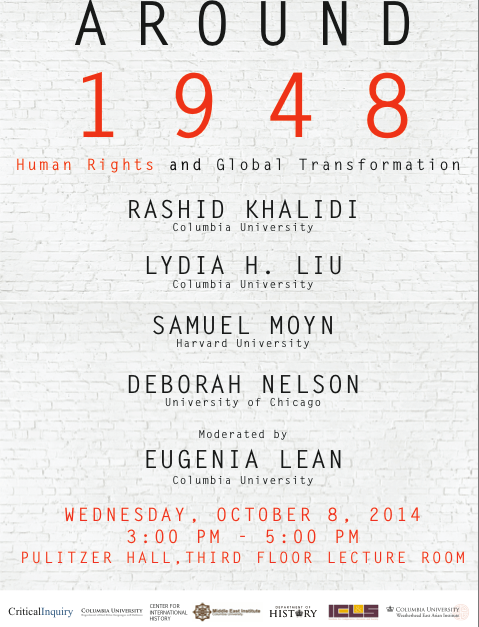
Leading scholars Rashid Khalidi, Lydia H. Liu, Samuel Moyn, and Deborah Nelson discuss the advent and the global impact of the 1948 Universal Declaration of Human Rights. Moderated by Eugenia Lean.
Panel Discussion
“Around 1948: Human Rights and Global Transformation”
Rashid Khalidi, Edward Said Professor of Modern Arab Studies, Columbia University
Lydia H. Liu, Wun Tsun Tam Professor in the Humanities, Columbia University
Samuel Moyn, Professor of Law and History, Harvard University
Deborah Nelson, Associate Professor of English, University of Chicago
Moderated by Eugenia Lean, Associate Professor of Chinese History, Columbia University
Wednesday, October 8
3:00 PM – 5:00 PM
Pulitzer Hall, Third Floor Lecture Hall
No registration required.
Co-sponsored by the Center for International History, Critical Inquiry, the Department of East Asian Languages and Cultures, the Department of History, the Institute for Comparative Literature and Society, and the Middle East Institute
A Panel discussion with Gaiutra Bahadur (journalist & writer), Dai Sil Kim-Gibson (independent filmmaker), Samip Mallick (archivist), Mae Ngai (professor, Columbia University), and Beresford Simmons (activist, musician)
What is the place of history in the shaping of narratives in and about immigrant communities in New York City? Immigration is often told as a story that begins with rupture and ends with assimilation – of severing roots, and building new ties. Yet, so often in New York with an immigrant population of 3 million, there are a richer, more complex stories to be found, archived, and told. How do immigrant stories shape New York, the “majority-minority” city? Join the Center for International History for a panel discussion as we navigate the question of immigrant histories and the shaping of NYC — through film, through literature- academic, fictional and journalistic- through music, archiving, and activism.
The Chile Reader: National History and Global Context in the Age of Transnational History
A book launch for The Chile Reader: Culture, Politics, History (Duke University Press, 2013) coedited by Elizabeth Quay Hutchison, Thomas Klubock, Nara Milanich, and Peter Winn
Panel discussion with Sol Serrano (Pontificia Universidad Católica, Chile) and Heidi Tinsman (UC Irvine)
Tuesday, April 15, 2014, 5:30 pm
Sulzberger Parlor, 3rd floor, Barnard Hall
Barnard College campus, entrance at 117th Street and Broadway
Sponsored by: Columbia Global Center/Santiago; Institute of Latin American Studies; Center for International History; Barnard Forum on Migration
April 25, 2014
SUICIDE AS EVENT? INTERVENING IN CHARLOTTE SALOMON’S INTERVENTIONS
Location: Fayerweather 411
Time: 4:00pm
Speakers: Darcy Buerkle (Smith College)